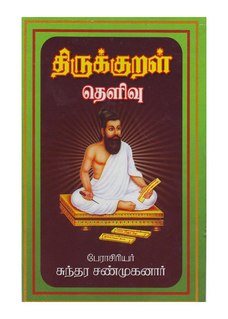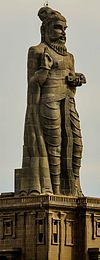Parimelalhagar, also known as Vanthuvarai Perumal, was a Tamil poet and scholar known for his commentary on the Thirukkural. He was the last among the canon of ten medieval commentators of the Kural text most highly esteemed by scholars. He was also among the five oldest commentators whose commentaries had been preserved and made available to the Modern era, the others being Manakkudavar, Pari Perumal, Kaalingar, and Paridhi. Of all the ancient commentaries available of the Kural literature, Parimelalhagar's commentary is considered by scholars as the best both in textual and in literary aspects. Parimelalhagar also remains the most reviewed, in terms of both praise and criticism, of all the medieval Kural commentators. Parimelalhagar's commentary is considered highly complex and exquisite in its own right that it has several scholarly commentaries appearing over the centuries to elucidate it. Along with the Kural text, Parimelalhagar's commentary has been widely published that it is in itself regarded a Tamil classic.

The Tirukkuṟaḷ, or shortly theKural, is a classic Tamil language text consisting of 1,330 short couplets of seven words each, or kurals. The text is divided into three books with aphoristic teachings on virtue (aram), wealth (porul) and love (inbam), respectively. Considered one of the greatest works on ethics and morality, it is known for its universality and secular nature. Its authorship is traditionally attributed to Valluvar, also known in full as Thiruvalluvar. The text has been dated variously from 300 BCE to 5th century CE. The traditional accounts describe it as the last work of the third Sangam, but linguistic analysis suggests a later date of 450 to 500 CE and that it was composed after the Sangam period.

S. Ramesan Nair was an Indian lyricist and poet who worked predominantly in the Malayalam film industry. He debuted with the movie Pathamudhayam in 1985. He was a recipient of the Sahitya Akademi Award. He wrote songs for 170 films and 3,000 devotional tracks. He also served as the state president of Tapasya Kala Sahithya Vedi, an art and literary organisation. He died on 18 June 2021 in a private hospital in Ernakulam due to COVID-19.
The Tirukkural, shortly known as the Kural, is a classic Tamil sangam treatise on the art of living. Consisting of 133 chapters with 1330 couplets or kurals, it deals with the everyday virtues of an individual. Authored by Valluvar between the first century BCE and 5th century CE, it is considered one of the greatest works ever written on ethics and morality and is praised for its universality and non-denominational nature.
Tirukkural, also known as the Kural, an ancient Indian treatise on the ethics and morality of the commoner, is one of the most widely translated non-religious works in the world. Authored by the ancient Tamil poet-philosopher Thiruvalluvar, it has been translated into at least 42 world languages, with about 57 different renderings in the English language alone.

Tirukkural remains one of the most widely translated non-religious works in the world. As of 2014, there were at least 57 versions available in the English language alone. English, thus, continues to remain the language with most number of translations available of the Kural text.

As of 2015, Latin is the first foreign language into which the Tirukkural was translated. There are three known translations of the Kural text available in Latin.
Hindi perhaps has the second most translations of the Tirukkural among all the languages in India, next only to Malayalam. As of 2000, there were at least 19 translations of the Kural text available in Hindi. Many of these translations are in verse form.
As of 2020, there were at least four translations of the Tirukkural available in Arabic. The Kural text is the first, and so far the only, Tamil work to be translated directly into Arabic. It is also the first Tamil work to be released in the Arabian soil.
Telugu is one of the Indian languages that has had the earliest Tirukkural translations in modern times. As of 2000, there were at least 14 translations of the Kural text available in Telugu.
As of 2015, Tirukkural has been translated into Dutch only once.
As of 2015, Fijian had at least two translations available of the Tirukkural.
Manakkudavar was a Tamil poet and commentator known for his commentary on the Tirukkural. His is the earliest of the available commentaries on the ancient work, and hence considered to bear closest semblance with the original work by Valluvar. He was among the canon of Ten Medieval Commentators of the Kural text most highly esteemed by scholars. He was among the five ancient commentators whose commentaries had been preserved and made available to the Modern era, the others being Pari Perumal, Kaalingar, Paridhi, and Parimelalhagar.
Paridhi, also referred to as Paridhiyaar, was a Tamil literary commentator known for his commentary on the Thirukkural. He was among the canon of ten medieval commentators of the Kural text most highly esteemed by scholars. He was also among the five ancient commentators whose commentaries had been preserved and made available to the Modern era, the others being Manakkudavar, Pari Perumal, Kaalingar, and Parimelalhagar.
The Ten Medieval Commentators were a canonical group of Tamil scholars whose commentaries on the ancient Indian didactic work of the Kural are esteemed by later scholars as worthy of critical analysis. These poets lived in the Medieval era between the 10th and 13th centuries CE. Among these medieval commentaries, the commentaries of Manakkudavar, Kaalingar, and Parimelalhagar are considered pioneer by modern scholars.
The Book ofAṟam, in full Aṟattuppāl, also known as the Book of Virtue, the First Book or Book One in translated versions, is the first of the three books or parts of the Kural literature, a didactic work authored by the ancient Indian philosopher Valluvar. Written in High Tamil distich form, it has 38 chapters each containing 10 kurals or couplets, making a total of 380 couplets, all dealing with the fundamental virtues of an individual. Aṟam, the Tamil term that loosely corresponds to the English term 'virtue', correlates with the first of the four ancient Indian values of dharma, artha, kama and moksha. The Book of Aṟam exclusively deals with virtues independent of the surroundings, including the vital principles of non-violence, moral vegetarianism, veracity, and righteousness.
Tiruvallam Bhaskaran Nair is a 20th-century Malayalam poet known for his Malayalam translation of the ancient Indian philosophical text of Tirukkural, among other Tamil, Sanskrit and English works. Nair translated only the first of the three books of the Kural text, and the translation was made in prose. The Sankaracharya of Kanchi has felicitated him as 'Kavyavallabhan'.
Tiruvalluva Maalai, literally 'Garland of Valluvar', is an anthology of ancient Tamil paeans containing fifty-five verses each written by different poets praising the ancient work of the Kural and its author Valluvar. With the poets' time spanning across centuries starting from around 1st century CE, the collection is believed to have reached its present form by 11th century CE. With the historical details of the ancient philosopher and his work remaining obscure, much of the legend on the Kural and Valluvar as they are known today are chiefly from this work. The collection also reveals the name of the author of the Kural text as 'Valluvar' for the first time, as Valluvar himself composed the Kural text centuries earlier without indicating his name anywhere in his work. Reminiscing this, E. S. Ariel, a French scholar of the 19th century, famously said of the Tirukkural thus: Ce livre sans nom, par un autre sans nom.
Tirukkural, or the Kural, an ancient Indian treatise on common moralities, has been given by various names ever since its writing between the first century BCE and the 5th century CE. Originally referred to as Muppāl, perhaps as presented by its author Valluvar himself at the ruler's court, the work remains unique among ancient works in that it was not given any title by its author himself. All the names that the work is referred by today are given by later days' scholars over the millennia. The work is known by an estimated 44 names excluding variants, although some scholars list even more. E. S. Ariel, a French scholar of the 19th century who translated the work into French, famously said of the Kural thus: Ce livre sans nom, par un autre sans nom.
The Book of Inbam, in full Iṉbattuppāl, or in a more sanskritized term Kāmattuppāl, also known as the Book of Love, the Third Book or Book Three in translated versions, is the third of the three books or parts of the Kural literature, authored by the ancient Indian philosopher Valluvar. Written in High Tamil distich form, it has 25 chapters each containing 10 kurals or couplets, making a total of 250 couplets all dealing with human love. The term inbam or kamam, which means 'pleasure', correlates with the third of the four ancient Indian values of dharma, artha, kama and moksha. However, unlike Kamasutra, which deals with different methods of lovemaking, the Book of Inbam expounds the virtues and emotions involved in conjugal love between a man and a woman, or virtues of an individual within the walls of intimacy, keeping aṟam or dharma as the base.





